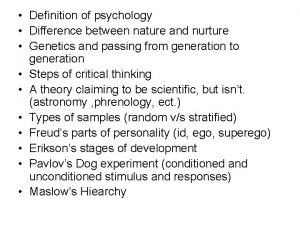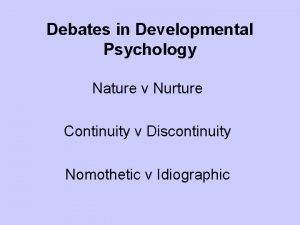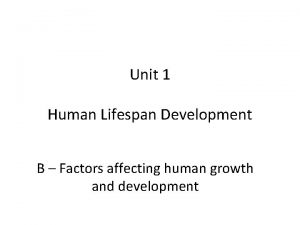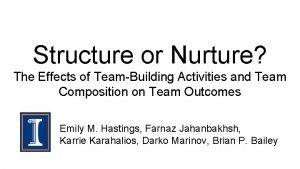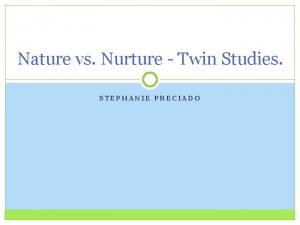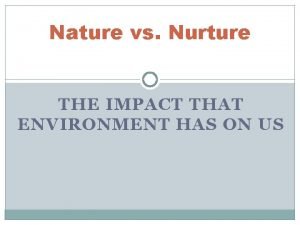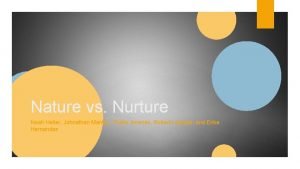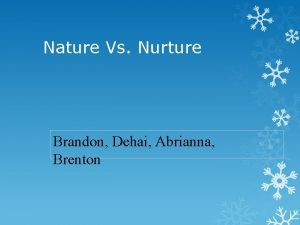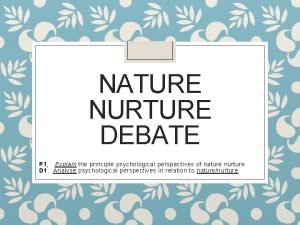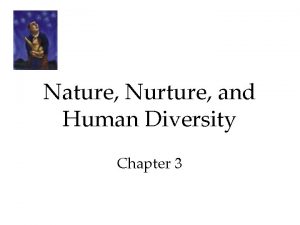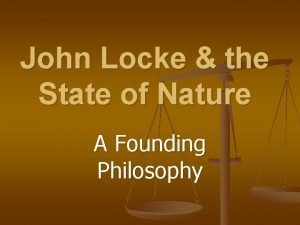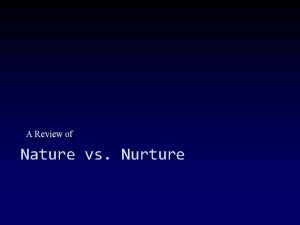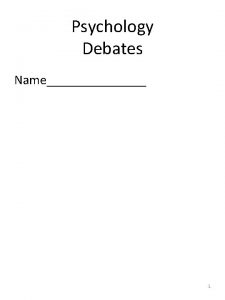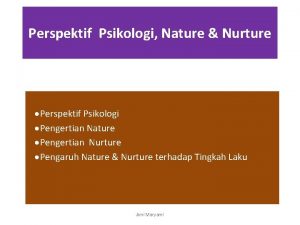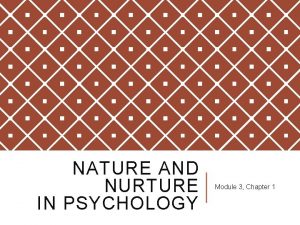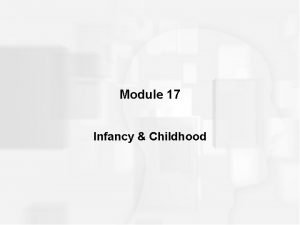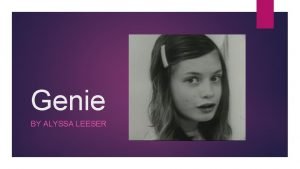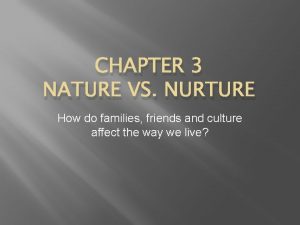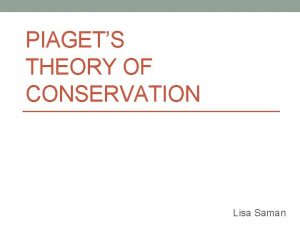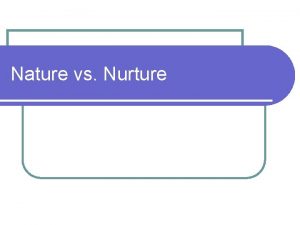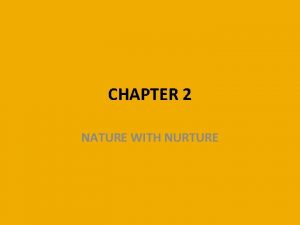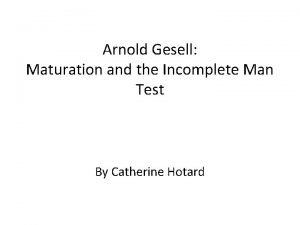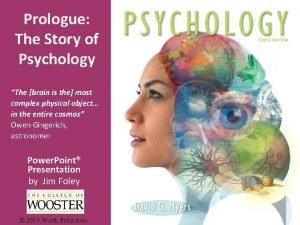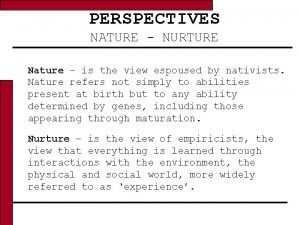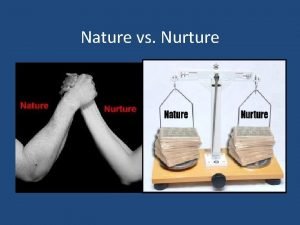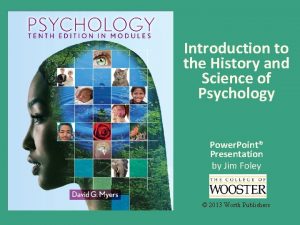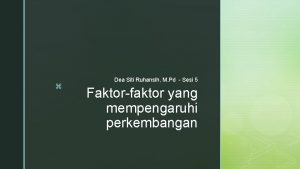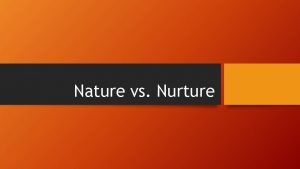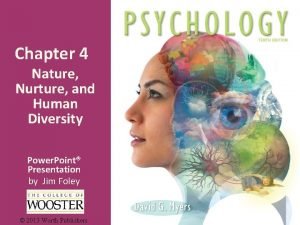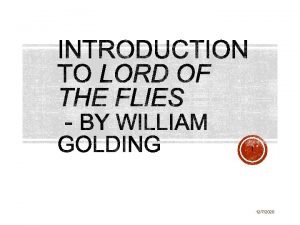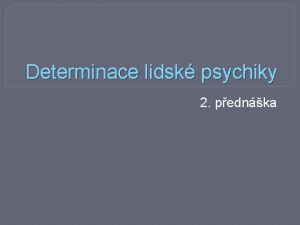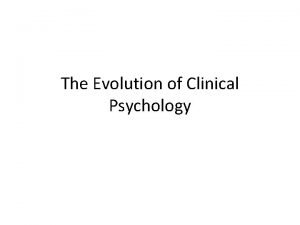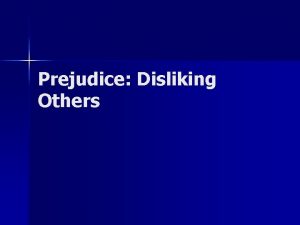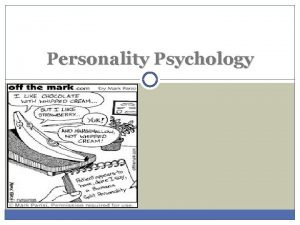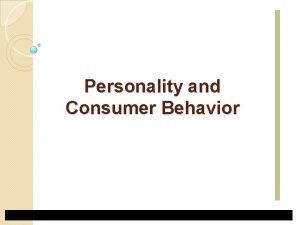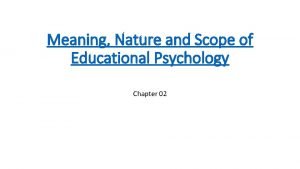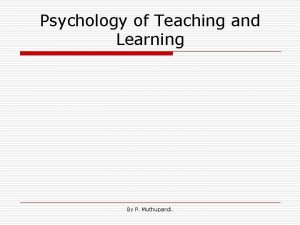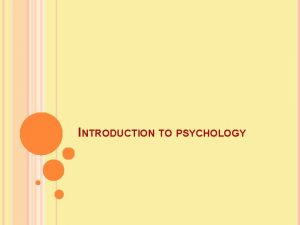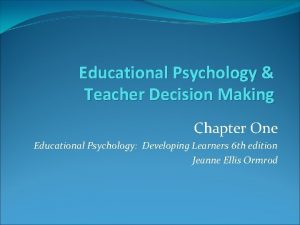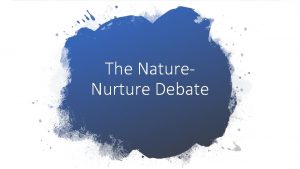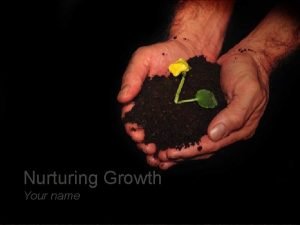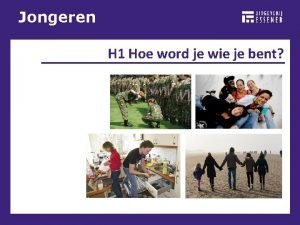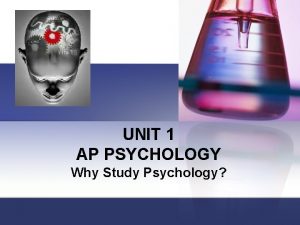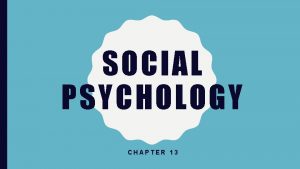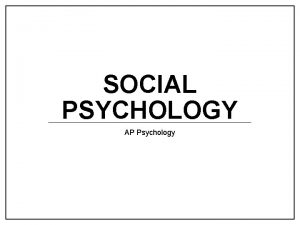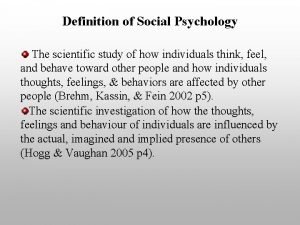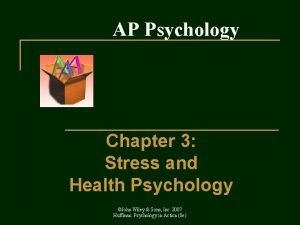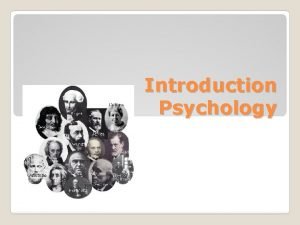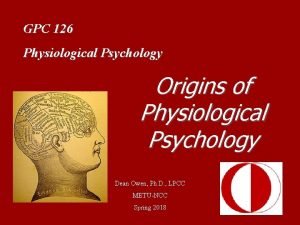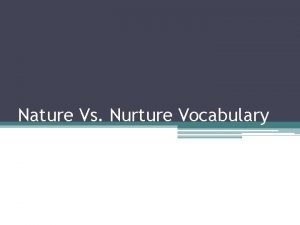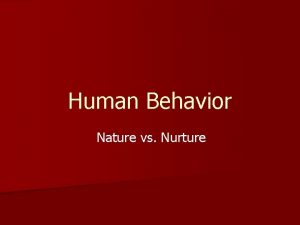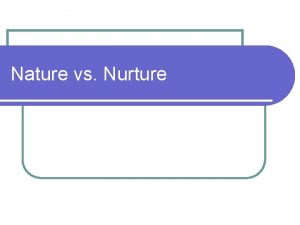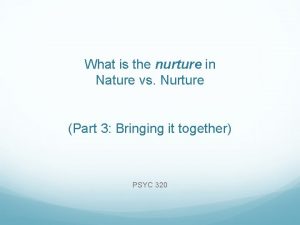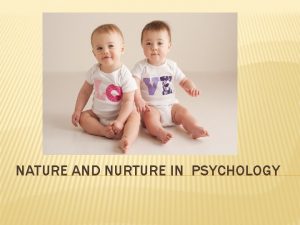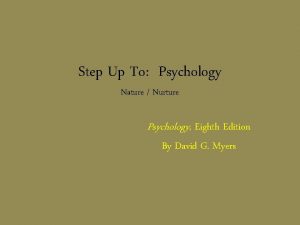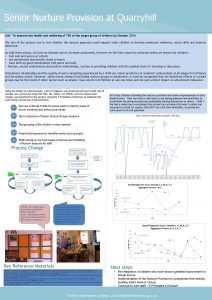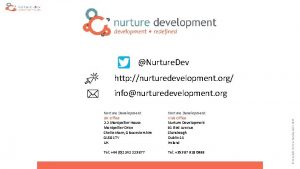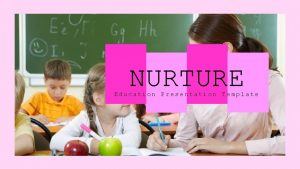History of Psychology Is it Nature or Nurture
































































- Slides: 64

History of Psychology

Is it Nature or Nurture?

Ancient Egypt • Egypt showed evidence of brain surgery as early as 3, 000 B. C. in papyrus writings found in Egypt. “Brain, ” the actual word itself, is used here for the first time in any language • The treatment was used for mental illnesses, epilepsy, headaches, organic diseases, neuropathy treatment, osteomyelitis, and for head injuries. • Brain surgery was also used for both spiritual and magical reasons

Ancient Egypt • The Ebers Papyrus (c. 1550 BC) mentions both depression and dementia. • Pharaoh Psamtik I tries an experiment. (c. 620 BC)

Ancient Greece “Whom the gods would destroy they first make mad. ”

Plato

Plato

Plato • Introspection

Aristotle

Aristotle • Associationism

Aristotle • Associationism • We seek pleasure, and avoid pain.

Hippocrates

Hippocrates • “There are in fact two things, science and opinion; the former begets knowledge, the latter ignorance. ”

Maybe it’s demons !

Wilhelm Wundt

Wilhelm Wundt • Structuralism

Wilhelm Wundt • Structuralism • The elements of consciousness are sensations (objective) and feelings (subjective)

Wilhelm Wundt • Structuralism • The elements of consciousness are sensations (objective) and feelings (subjective) • Set up the first laboratory

William James

William James • Functionalism

William James • Functionalism • Mental processes help us adapt

William James • Functionalism • Mental processes help us adapt • Adaptive patterns become habits

Sigmund Freud


Freud’s Theories

Freud’s Theories • Much deeper introspection

Freud’s Theories • Much deeper introspection • Unconscious motives

Freud’s Theories • Much deeper introspection • Unconscious motives • Internal conflict

Freud’s Theories • Much deeper introspection • Unconscious motives • Internal conflict • It’s mostly about SEX

Freud’s Theories • Much deeper introspection • Unconscious motives • Internal conflict • It’s mostly about SEX • Tools we can use:

Freud’s Theories • Much deeper introspection • Unconscious motives • Internal conflict • It’s mostly about SEX • Tools we can use: • Psychoanalysis

Freud’s Theories • Much deeper introspection • Unconscious motives • Internal conflict • It’s mostly about SEX • Tools we can use: • Psychoanalysis • Hypnosis

Freud’s Theories • Much deeper introspection • Unconscious motives • Internal conflict • It’s mostly about SEX • Tools we can use: • Psychoanalysis • Hypnosis • Free Association

Freud’s Theories • Much deeper introspection • Unconscious motives • Internal conflict • It’s mostly about SEX • Tools we can use: • Psychoanalysis • Hypnosis • Free Association • Interpretation of Dreams

Big Argument Time

Big Argument Time Can Cognitive Processes be understood?

Ivan Pavlov

Pavlov’s Dog

The Advent of Classical Conditioning

John B Watson

John B Watson • Behaviorism

John B Watson • Behaviorism • Natural Science

John B Watson • Behaviorism • Natural Science • We are conditioned by external events.

John B Watson • Behaviorism • Natural Science • We are conditioned by external events. • “Choice” is an illusion.

John B Watson

B. F. Skinner

B. F. Skinner • Stimulus – Response

B. F. Skinner • Stimulus – Response • Positive & Negative Reinforcement

So, how is Operant Conditioning different? • Classical Conditioning relies on the subject to involuntarily react to an association between two events. – “When the bell rings, I will salivate because I expect to get food. ” Dog • Operant Conditioning relies on the subject to ACT in a way that will cause a specific result. – “If I sit here quietly, Mr. Woody will like me, and my grade will be better. ” Student

Operant Conditioning uses… • REINFORCEMENT – Positive: Add something desirable – Negative: Remove something undesirable • SCHEDULES – Fixed or Variable – Ratio or Interval • PUNISHMENT – Positive: Give you something you don’t want – Negative: Take away something you DO want

And then there’s the Cognitive Effect

Modern Schools of Thought • PSYCHODYNAMIC – Believes that behavior comes from unconscious drives and conflicts – Studies childhood traumas and unfulfilled wishes for clues to current behavior – Uses analysis, dream interpretation, and other unconscious evidence for information, and selfinsight to move toward health

The Modern Schools of Thought • BEHAVIORAL – Believes that how we ACT is the key to who we ARE – Wants to study, measure, and figure out the origins of our observable responses to stimuli – Wants to know why we act the way we do, and the best ways to change behaviors that are diminishing our quality of life

The Modern Schools of Thought • BIOLOGICAL – Believes that the Brain and Nervous System allow our emotions, memories, and senses – Uses CAT and PET scans to look for evidence, and looks at genes and hormones for clues – Wants to know how the body’s elements produce the unique person we each become

Modern Schools of Thought • COGNITIVE – Believes that the way we acquire, process, store, and recall information explains our psychology – Believes our Perceptions, Values & Choices lead to behaviors – Studies our processes and beliefs to understand how we reason and solve problems, as well as why we act the way we do

Modern Schools of Thought • HUMANISTIC – Believes that we strive for love, acceptance, and self-fulfillment – Places value on individual experiences, and believes self-awareness is vital to healing – Studies feelings to see if impulses can be controlled, barriers overcome, and potential fulfilled

Modern Schools of Thought • SOCIOCULTURAL – Believes that humans are different largely because of social differences – Studies the effects of ethnicity, gender, culture (both large-scale and family), and economics on human thought and behavior

Modern Schools of Thought • LEARNING – Believes that our experiences shape our behavior – Believes that learning can be intentional, and that we can use it to shape our behavior and even change our environment – Uses teaching techniques to help clients learn better practices

Modern Schools of Thought • EVOLUTIONARY – Believes that human adaptation to our environment has created our behaviors and thoughts – Studies changes that occur in humans over time for clues to the reasons behind our thoughts and behaviors

Modern Schools of Thought • BIOPSYCHOSOCIAL – Gestalt theory developed by George Engel – Believes that the only complete picture of a person must include all of the above ideas

Gestalt • Think “whole” – it’s German for “shape”

Gestalt • Think “whole” – it’s German for “shape” • The whole is greater than the sum of its parts.

Gestalt • Think “whole” – it’s German for “shape” • The whole is greater than the sum of its parts. • Problem-solving through – Similarity – Closure – Insight

Gestalt • Think “whole” – it’s German for “shape” • The whole is greater than the sum of its parts. • Problem-solving through – Similarity – Closure – Insight • Learning has purpose!
 Nature v nurture psychology definition
Nature v nurture psychology definition What is nurture
What is nurture Continuity and discontinuity examples psychology
Continuity and discontinuity examples psychology Gessel theory
Gessel theory Nature vs nurture activities
Nature vs nurture activities Daphne goodship and barbara herbert
Daphne goodship and barbara herbert Oxana malaya
Oxana malaya Noah heller
Noah heller Nature vs nurture examples
Nature vs nurture examples Principles of nature and nurture
Principles of nature and nurture Powerpoint
Powerpoint Nature of nurture chapter 3
Nature of nurture chapter 3 John locke nature nurture
John locke nature nurture Nature vs nurture dalam psikologi
Nature vs nurture dalam psikologi Chomsky nature vs nurture
Chomsky nature vs nurture Nature versus nurture debate
Nature versus nurture debate Strengths and weaknesses of nature vs nurture
Strengths and weaknesses of nature vs nurture Nature dan nurture dalam psikologi
Nature dan nurture dalam psikologi Nature and nurture
Nature and nurture Nature and nurture
Nature and nurture The nature-nurture question asks
The nature-nurture question asks Dorothy irene wiley
Dorothy irene wiley Man's sinful nature
Man's sinful nature Nature of nurture chapter 3
Nature of nurture chapter 3 Sa man lisa
Sa man lisa Nature vs nurture quiz
Nature vs nurture quiz Nature of nurture chapter 2
Nature of nurture chapter 2 Gesell's theory
Gesell's theory Nurture works on what nature endows
Nurture works on what nature endows Nurture definition psychology
Nurture definition psychology Nature vs nurture worksheet
Nature vs nurture worksheet Nurture works on what nature endows
Nurture works on what nature endows Pengaruh faktor nature dan nurture terhadap perkembangan
Pengaruh faktor nature dan nurture terhadap perkembangan Aggression nature vs nurture
Aggression nature vs nurture Nature vs nurture
Nature vs nurture Bobo doll experiment nature vs nurture
Bobo doll experiment nature vs nurture Nature vs nurture quiz
Nature vs nurture quiz Nature nurture theory piaget
Nature nurture theory piaget Nature nurture and human diversity
Nature nurture and human diversity Jean jacques rousseau nature vs nurture
Jean jacques rousseau nature vs nurture Nature
Nature Nature and nature's law lay hid in night
Nature and nature's law lay hid in night Nature nature controversy
Nature nature controversy Nature and scope of clinical psychology
Nature and scope of clinical psychology Nature and power of prejudice in social psychology
Nature and power of prejudice in social psychology Reciprocal determinism definition psychology
Reciprocal determinism definition psychology Personality in consumer behavior
Personality in consumer behavior Scope of education psychology
Scope of education psychology Nature of personality in psychology
Nature of personality in psychology Definitions of educational psychology
Definitions of educational psychology Psychology studies
Psychology studies Discuss briefly the nature of educational psychology
Discuss briefly the nature of educational psychology Nurture examples in real life
Nurture examples in real life Nurture bullet
Nurture bullet Nurture van een eeneiige tweeling
Nurture van een eeneiige tweeling Nurture aanhangers
Nurture aanhangers Positive psychology ap psychology definition
Positive psychology ap psychology definition Aggressive role
Aggressive role Social psychology ap psychology
Social psychology ap psychology Social psychology is the scientific study of
Social psychology is the scientific study of Health psychology definition ap psychology
Health psychology definition ap psychology Wilhelm wundt structuralism
Wilhelm wundt structuralism Physiological psychology
Physiological psychology Emphasis
Emphasis History of criminal psychology
History of criminal psychology
